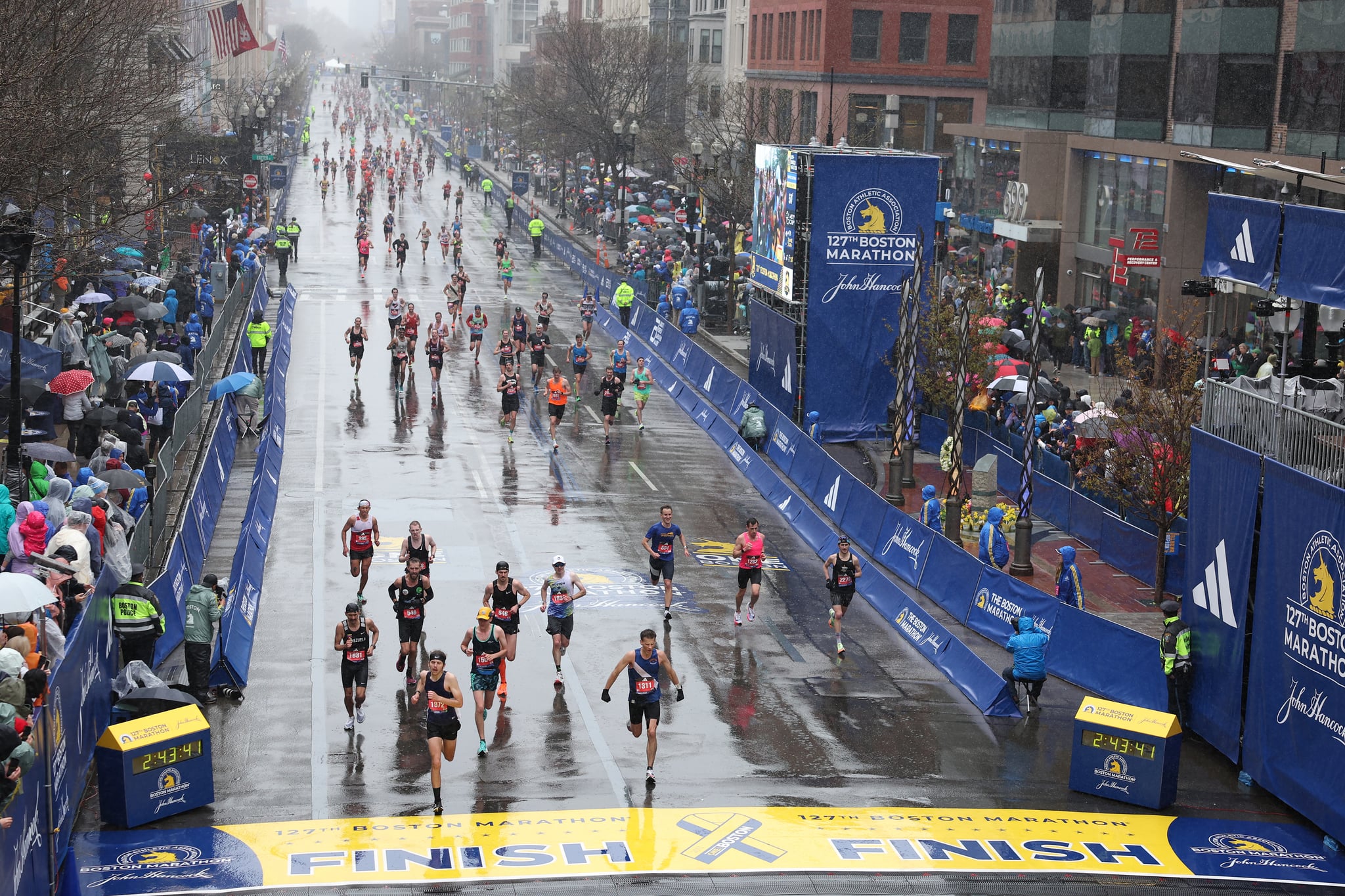
The 127th Boston Marathon is underway today, and it’s the first time in its history that the race has officially welcomed nonbinary runners. Of course, nonbinary athletes have long been competing in sporting events and marathons — but the difference is that this year, they weren’t forced to register under the men’s or women’s divisions. The Boston Athletic Association (BAA), which organizes the race, welcomed a total of 27 athletes in the inaugural running of the nonbinary division as part of the 30K total runners hitting the course this year.
In a race-day tweet, sports blogger James Runge called it “a step, literally, in the right direction of acceptance and inclusion.”
Though results are still unofficial, runner Kae Ravichandran appears to have finished in the top spot in the division with a time of 02:38:57. They were followed by Cal Calamia with 02:51:00 and Matthew Powers with 2:54:54. There isn’t prize money for winners in the nonbinary division, but awards will go to first, second, and third places in the category once results are finalized. The men’s and women’s winners — Evans Chebet and Hellen Obiri — each received $150,000, while wheelchair, masters, and para divisions also won prize money.
DYK 💭 💭
For the 1st time in history, today’s Boston Marathon race included a nonbinary division?
27 athletes registered in the inaugural running of the division
A step, literally, in the right direction of acceptance and inclusion#RepresentationMatters
❤️🧡💛💚💙💜— JCR (He/Him/His) 🇺🇦 (@twinetime14) April 17, 2023
“I have wanted to run the Marathon in Boston my whole life,” Calamia, founder of the Non-Binary Run Club in San Fransisco, wrote in an Instagram post a week ahead of the race. “I registered as female three years ago, but it got postponed due to the pandemic. Two years ago, I tore my ACL playing soccer just weeks away from the race. Now, two knee surgeries and a whole lot of work later, I’m just days out from running in Boston’s first ever non-binary category. I felt like everything was in my way of running this race. But it turns out I was granted the time and space to advocate for change that would allow me to fulfill my dream in a way I couldn’t have even imagined three years ago.”
“To be able to do it in this way, in this category, makes it so much more special,” Calamia told the Associated Press after the race. “Knowing how much work has gone into getting this category – in a way, that was already a win.”
The fact that non-binary athletes are crossing the Boston Marathon finish line in their own category today is a heartening win amidst unprecedented anti-trans legislation in several states as well as anti-trans sanctions in many sports, including running. Just a few weeks ago, World Athletics, the international organization for track and field, announced that transgender women are no longer allowed to compete in the “female category” at international events.
Trans and nonbinary athletes must often register under their sex assigned at birth to compete — even if that’s no longer their gender identity. For example, trans pro skater Leo Baker was faced with the decision to either compete in the women’s Olympic team or bow out after being faced with “mandated gender verification.” They chose the latter. Baker’s story is common in the often fraught world of sports for those who aren’t cisgender. Both the international swimming federation and the International Rugby League have recently barred trans women from competition, and even nonprofessional sports spaces such as school and club sports for children and teens are a battleground for trans people.
“Such a large portion of the conversation around transgender inclusion in sports lacks a very fundamental piece that is crucial to the conversation: trans people are just people. We are not just our biology. There is so much talk about biology when it comes to trans athletes but never as much about us as humans. As people,” track and field athlete Andraya Yearwood previously told POPSUGAR. “When legislators and lawmakers continuously dehumanize trans athletes over and over again, it begins to create this very harmful rhetoric around how we identify and ultimately how we live.”
The BAA’s gesture of inclusion is a breath of fresh air in a particularly trans-hostile climate. The BAA first announced the new division on Sept. 12, 2022, upon opening registration for the race. The organization shared on its website that it was “working on expanding opportunities for non-binary athletes at our events, including the upcoming 2023 Boston Marathon.”
For the 2023 race, the BAA didn’t yet have qualifying standards for the non-binary division, so runners seeking entry must have achieved the women’s qualifying standard. But non-binary qualifying standards for future Boston Marathons will be announced following the 2023 race.
“As we prepare for future races, participants can expect non-binary times to be updated accordingly. We view this first year as an opportunity to learn and grow together,” the BAA said in September 2022.
We only hope other athletic associations will follow suit in creating a more welcoming and inclusive environment, allowing all athletes to register for competition outside the binary.
— Additional reporting by Lauren Mazzo
Image Source: Getty / Omar Rawlings
